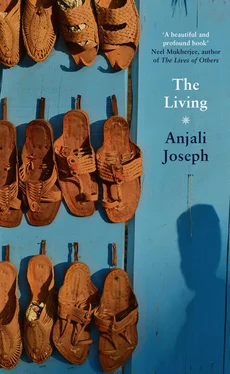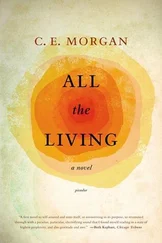Again I passed the old man in his handcart. He looked up and threw out something hoarse. I waved. But he beckoned me over.
What did you say? I enquired.
How’s yourself? he wheezed. I stared. Your health, he said.
I’m all right, I said, it’ll be all right. I’m going to be all right. How are you?
I held on to the side of the handcart.
His eyes, sharp and brown but so deeply sunken in the face, looked at me over spectacles. They said you were having trouble with your waterworks, he observed, loudly as though it was I, not he, who couldn’t hear. I see you coming and going a lot. He indicated the outhouse. I see you coming and going.
A fleck of spittle landed on my cheek.
I closed my eyes, opened them. The sun was hot on my head. Yes, I said. I have been coming and going more.
He nodded, eyes cunning. It happens, he said. He smiled, a thin smile, to indicate that the conversation had ended, and I went back to my house. Who has any privacy in this world? And yet somehow I’d remained unseen amid it.
I went to lie down, and turned on the radio. The familiar voice began, This is the Voi— but it dwindled and died. I shook the radio, switched it off and on.
The radio’s stopped working, I said. She carried on wiping things, lining the cupboard shelves with newsprint.
I realised what I’d been missing. Where’s Tuka? I said. I thought he’d come and sleep with me. I haven’t seen him all day. Was he there this morning?
She turned then. No, she said.
Where is he? I said. I lay down and felt uneasy. I started to sleep, but a wedding band passed, loudspeakers and cacophony, and a mosquito began to whine near my ear. I missed the radio, and worried about Tuka. He’s not young any more. What if a dog had caught him? Or he’d been run over? My imagination went out to him, wherever he was, injured, hungry, lost somewhere.
As the Sumo pulled away I craned over my shoulder. The house looked small and crumpled, our blue door closed. Most of all I didn’t see what I was keenly looking for.
She glanced at me. She knew what I was thinking, but she didn’t say the comforting thing: He’ll be back, don’t worry, or, He’s all right, wherever he is.
I sighed. Lately, I don’t know when, I have begun to sigh suddenly and deeply. Or maybe I have only noticed it recently. I swallowed down what seemed to be bile and settled myself for the journey.
Next to me, Anil and my daughter-in-law were discussing what would happen at the wedding, and who would be there. My brother’s sons and their children; people from the groom’s side, and all of us in the house. Deepak and his family would come directly from Pune. I regarded the back of Prakash’s head. The Sumo had been his idea. He knew someone; we’d hired it at a discount. It’ll be more comfortable, he said, eyeing his decrepit father. I hadn’t demurred.
I waited for our first halt, ostensibly for tea, but actually because I wanted to hobble around the back of the dhaba and see what happened. Prakash shot me a glance and stayed in front, chatting to Nitin, the driver. As I came back out I saw Anil, hanging off his father’s arm, and singing to himself while spinning around. Prakash carried on talking to Nitin on whose face a pair of sunglasses flashed. He didn’t turn, but his hand went down and held his son’s shoulder. I saw the satisfaction on the boy’s face and felt a pang of envy — at my age — then surprise. How secure his father makes him feel.
Nitin and Anil went to the bathroom and I lowered myself to the wall near which we were parked. Prakash hesitated and sat next to me. We’d left home at eight. Now it was nine thirty. We would arrive in time for lunch. I felt no hurry to get to Miraj. Perhaps I even felt apprehensive. It was so long since I had been there. I gazed at the sunny road, and the sign saying Aashirwad Garden Hotel and Restaurant.
The case has been dropped, Prakash said, and I turned to him.
Oh? I said. I didn’t know.
Yes.
Good, I said.
His large hands pushed imaginary sleeves up his forearms. Vigorous arms, the arms of a man in or approaching the prime of his life. When had my prime been? When had the moment happened?
The police, he began. When I was at the police station.
My stomach empty, my bladder for once quiet, I said nothing. The sunlit morning, the heat, the cars passing, and we on our way but not yet arrived, not yet required to fulfil any role, represent anything, it was restful.
When they were — I got beaten up, Prakash said.
Yes, I said.
He gave me a suspicious look, but I’d had nothing else to say.
At the time, he said, it struck me that — I realised something.
Oh? I said. I looked at my right foot. The big nail is misshapen from too many accidents with the hammer.
I realised none of it mattered, he said. Now he too looked at his feet, big and strong, the toes hairy in sports sandals.
I waited.
It really hurt, he said, and there was a note of surprise in his voice. He could have been the boy I remembered, thirteen or fourteen years old.
I patted his shoulder.
There’s no — there’s nothing like the future, he said.
Was he about to cry? I hoped not. Mm, mm, I said pre-emptively, wondering what the others could be doing inside for so long. When you travel, routine goes out of the window. You wouldn’t ordinarily allow your child to stuff himself with fried food, but the usual rules stop operating.
Prakash turned to me. His eyes found mine. Nothing matters, he repeated. We don’t affect anything. The reasons we think we do things … He looked down. Nothing matters.
Mm, I said.
I’ve been thinking, I might go on the wari next year.
You?
Yes. Suddenly he looked younger.
Oh. Well, I don’t know so much about it, but it takes time, doesn’t it? And it’s not just the pilgrimage. You have to follow some rules. No meat. No alcohol.
He nodded. Yes, I know, he said. I thought it might be good.
I considered my hands. Why did you get into that fight? I asked.
His head moved suddenly towards me and I recoiled. Don’t you — you’re really asking? he snapped.
Oh, but — after all this time? What would it change? I said. I felt ancient, like someone from another world.
They came out of the dhaba, she and my daughter-in-law and Anil. The boy was having his face wiped. His eyes were glazed.
It seemed later than it was.
*
I was at the sea, at Chowpatty in Mumbai. The air tasted different here — of salt, and freedom. The sea was green, not clear, and the buildings curved like they do in the films. I ate gola that made my throat sore and walked to the edge of the water. There was sand under my feet; I’d taken off my chappals, and was carrying them. I heard voices speaking several languages. The breeze was warm, and savoury.
At the water’s edge a wave licked my foot, its touch warm as a cat’s tongue. I yelped and moved back, and a couple walking past laughed. The setting sun, its gold and glamour blown by the breeze, glanced off them.
But my neck snapped, and my eyes showed me a road with trees, much closer to home, but changed, and then, with a filmic slowness, suddenly a black motorcycle snaked across our path. The young rider wasn’t looking. He was reversing from under a tree. We would hit him straight on.
Not at the last moment, but after it, Nitin made a big turn of the wheel and we shaved past the bike.
Prakash shouted out of the window.
I–I said.
Yes, said my wife.
I was sure we were going to hit him.
Did you notice, she said, how time slowed down?
I saw the black of the bike, and its dancing movement, a cobra rising. There are times you feel something has reached out to tap you on the shoulder.
Читать дальше
Конец ознакомительного отрывка
Купить книгу











